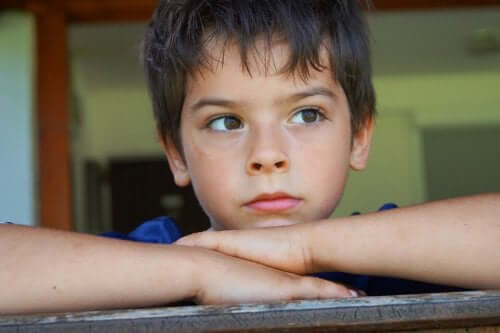9 Techniques to Teach Your Child to Manage Frustration


Written and verified by the child educator Pedro González Núñez
All of us at some point in our lives have felt frustrated because things haven’t turned out the way we wanted. This also happens with children. But unlike adults, they find it difficult to control the reaction that’s triggered when something doesn’t go the way they want. However, there are techniques for them to learn to manage frustration.
We must distinguish intolerance of frustration from a normal response to a child who has lost a game, or his parents haven’t bought them what they wanted, etc. If they only express discomfort, their reaction isn’t disproportionate, and they become discouraged, this is normal. What’s not normal or healthy are tantrums, yelling, insults, anger–in short, aggressive responses.
The fact that children have a low tolerance for frustration can be due to many causes: Low self-esteem, not knowing how to accept failures, being excessively pampered and overprotected, etc.

Also, overprotection is one of the main causes of a child having a low tolerance for frustration.
It’s important that, from a young age, they understand that you don’t always get what your want, nor can they win at everything. This will help them to face adverse situations in the future because not everything will be a success. There will also be failures.
As adults, we’re better at controlling our reactions. But it’s much harder for children, so our job as parents is to teach them to achieve it.
Next, we are going to analyze a series of techniques to teach the child to handle frustration.
Techniques to help children manage frustration
Avoid overprotection and excess permissiveness
Overprotection keeps children from facing failure. We prevent this from occurring by doing everything for them, helping them in everything, avoiding any problems, etc. Permissiveness makes kids unable to cope with problems, as they always get what they want.
Set an example
The positive attitude with which parents face a failure or a difficult situation will serve as an example for them to learn to solve their problems.
Let them get frustrated
When your child gets angry, yells, or kicks, don’t go immediately to satisfy their demands. This way, they’ll accept that they’re not always right and will have to find the right solution to difficult situations.
Avoid seeing failures as something negative
Explain that in life there will be times of success and others of failure. Failures are learning opportunities as they help us to improve and give us the possibility of growing as people as well. The important thing is to realize where we’ve gone wrong and how we can fix it to prevent it from happening again.

Educate them on the value of effort
Children must be taught how important it is to make an effort in everything they do. All things are achieved through effort, and in many moments, this will be what helps them solve their failures.
Set reasonable goals
You have to set realistic goals that are appropriate to the age and maturity of the child. This way, they’ll have more tolerance for frustration. If the goals aren’t appropriate for their age, they’ll be unable to meet them and will fail, only increasing their personal discomfort.
Teach them to be persistent
It’s essential to overcome difficult situations. If the child learns to be consistent in everything they do, they’ll be able to solve many of the problems that come their way and they’ll be able to handle frustration.
Reinforce them when they react appropriately to a difficult situation
When the child, faced with a complicated situation, is able to keep from reacting with their usual aggressive response, we must always praise them.
Promote independence
Do this when children are no longer babies (2, 3, or 4 years), have acquired a certain degree of autonomy, and want to do things on their own (eat, dress, etc.). Encourage this autonomy, let them do tasks alone and, in this way, they’ll have tools to tolerate frustration.
Frustration is characteristic of the human being. If we parents insist on avoiding it, we’re condemning our children to unhappiness. Being able to manage frustration implies being able to cope with the problems that we encounter throughout life. If we try to please our children in everything to prevent them from getting frustrated, the only thing we’re doing is preventing their development as people.
Always remember that a happy person isn’t one who never makes mistakes or who has everything they want. A happy person is one who faces their mistakes and learns from them.
All of us at some point in our lives have felt frustrated because things haven’t turned out the way we wanted. This also happens with children. But unlike adults, they find it difficult to control the reaction that’s triggered when something doesn’t go the way they want. However, there are techniques for them to learn to manage frustration.
We must distinguish intolerance of frustration from a normal response to a child who has lost a game, or his parents haven’t bought them what they wanted, etc. If they only express discomfort, their reaction isn’t disproportionate, and they become discouraged, this is normal. What’s not normal or healthy are tantrums, yelling, insults, anger–in short, aggressive responses.
The fact that children have a low tolerance for frustration can be due to many causes: Low self-esteem, not knowing how to accept failures, being excessively pampered and overprotected, etc.

Also, overprotection is one of the main causes of a child having a low tolerance for frustration.
It’s important that, from a young age, they understand that you don’t always get what your want, nor can they win at everything. This will help them to face adverse situations in the future because not everything will be a success. There will also be failures.
As adults, we’re better at controlling our reactions. But it’s much harder for children, so our job as parents is to teach them to achieve it.
Next, we are going to analyze a series of techniques to teach the child to handle frustration.
Techniques to help children manage frustration
Avoid overprotection and excess permissiveness
Overprotection keeps children from facing failure. We prevent this from occurring by doing everything for them, helping them in everything, avoiding any problems, etc. Permissiveness makes kids unable to cope with problems, as they always get what they want.
Set an example
The positive attitude with which parents face a failure or a difficult situation will serve as an example for them to learn to solve their problems.
Let them get frustrated
When your child gets angry, yells, or kicks, don’t go immediately to satisfy their demands. This way, they’ll accept that they’re not always right and will have to find the right solution to difficult situations.
Avoid seeing failures as something negative
Explain that in life there will be times of success and others of failure. Failures are learning opportunities as they help us to improve and give us the possibility of growing as people as well. The important thing is to realize where we’ve gone wrong and how we can fix it to prevent it from happening again.

Educate them on the value of effort
Children must be taught how important it is to make an effort in everything they do. All things are achieved through effort, and in many moments, this will be what helps them solve their failures.
Set reasonable goals
You have to set realistic goals that are appropriate to the age and maturity of the child. This way, they’ll have more tolerance for frustration. If the goals aren’t appropriate for their age, they’ll be unable to meet them and will fail, only increasing their personal discomfort.
Teach them to be persistent
It’s essential to overcome difficult situations. If the child learns to be consistent in everything they do, they’ll be able to solve many of the problems that come their way and they’ll be able to handle frustration.
Reinforce them when they react appropriately to a difficult situation
When the child, faced with a complicated situation, is able to keep from reacting with their usual aggressive response, we must always praise them.
Promote independence
Do this when children are no longer babies (2, 3, or 4 years), have acquired a certain degree of autonomy, and want to do things on their own (eat, dress, etc.). Encourage this autonomy, let them do tasks alone and, in this way, they’ll have tools to tolerate frustration.
Frustration is characteristic of the human being. If we parents insist on avoiding it, we’re condemning our children to unhappiness. Being able to manage frustration implies being able to cope with the problems that we encounter throughout life. If we try to please our children in everything to prevent them from getting frustrated, the only thing we’re doing is preventing their development as people.
Always remember that a happy person isn’t one who never makes mistakes or who has everything they want. A happy person is one who faces their mistakes and learns from them.
All cited sources were thoroughly reviewed by our team to ensure their quality, reliability, currency, and validity. The bibliography of this article was considered reliable and of academic or scientific accuracy.
- Bandura, A. (s.f.) Teorías de la personalidad. Traducción al castellano de Rafael Gautier.
- García, C. Las emociones en los niños. https://edukame.com/sites/default/files/pdf_las_emociones_en_los_ninos_v2.0_previo.pdf
- i Soler, J. F. (2002). Perfil de personalidad neurótica y su prevención en la edad adulta Profile of the neurotic personality and its prevention in adulthood. In ANALES Sis San Navarra (Vol. 25, No. Suplemento 2).
- Mojonero Román, M., & Bustamante, J. C. El abordaje de la tolerancia a la frustración en educación primaria: una propuesta de intervención. https://zaguan.unizar.es/record/87989/files/TAZ-TFG-2019-3758.pdf
- Muñoz, A. (2005). La baja tolerancia a la frustración. Extraído el, 20.
- Hurtado, M., De la Cruz, P., & Robles, X. (2015). MANEJO DE FRUSTRACIÓN EN NIÑOS. http://se-humanitas.com.mx/autoadministrable/PDF/formacion_padres/07.pdf
- Rodríguez Ruiz, C. (2013) Enseñar a los niños a afrontar los fracasos y la frustración. Educapeques portal de educación infantil y primaria.
- Rodríguez Yagüe, R. (2015). La frustración en la etapa de Educación Infantil. http://uvadoc.uva.es/handle/10324/14479
- Viaplana-Moré, G. (2015). Aprender a tolerar la frustración en el segundo ciclo de Educación Infantil (Bachelor’s thesis). https://reunir.unir.net/bitstream/handle/123456789/2844/Gemma_Viaplana_More.pdf?sequence=1&isAllowed=y
This text is provided for informational purposes only and does not replace consultation with a professional. If in doubt, consult your specialist.








